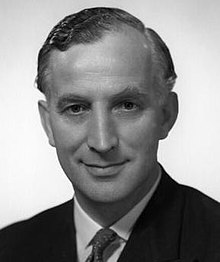Fred Peart, Baron Peart
Thomas Frederick Peart, Baron Peart, PC (30 April 1914 – 26 August 1988) was a British Labour politician who served in the Labour governments of the 1960s and 1970s and was a candidate for Deputy Leader of the Party.
Early life and education[edit]
The son of Emerson Featherstone Peart, a headmaster and leading Labour member of Durham County Council, and Florence Blissenden, Peart himself qualified as a teacher at the University of Durham in 1936. During his time at university he was President of the Durham Union for Epiphany term of 1936.[1] He served in the Royal Artillery in World War II, gaining the rank of captain.
Political career[edit]
Peart was elected Member of Parliament for Workington in 1945, serving until 1976. He initially served as PPS to the Minister of Agriculture & Fisheries (Tom Williams).
Peart, along with the rest of the Labour Party, went into opposition after Sir Winston Churchill's 1951 election victory. In 1964, he returned to government after Harold Wilson defeated Sir Alec Douglas-Home at that year's election. He was appointed to the Cabinet holding the Cabinet post of Minister of Agriculture, Fisheries and Food. His tenure saw advances in pay for agricultural labourers, and in technology. In 1968, Peart became Lord Privy Seal, with no particular responsibilities. Seven months later, Peart became Leader of the House of Commons, taking the subsidiary title Lord President of the Council. After Labour lost the 1970 election, Peart returned to opposition as Shadow Leader of the House of Commons. He held that position until December 1971, when he became Shadow Agriculture Minister.[2] When Labour returned to power, Peart once more took the Agriculture portfolio.
On 6 June 1975, Peart was involved in a train accident; he was on board a London to Glasgow sleeper train which crashed at Nuneaton, he survived the accident with minor injuries.[3]
On 23 September 1976, Peart was created a life peer as Baron Peart, of Workington in the County of Cumbria,[4] to serve as Leader of the House of Lords and Lord Privy Seal at a time when the Labour faction in the Lords was tiny compared to the vast Tory majority, mainly composed of hereditary peers.
After Margaret Thatcher won the 1979 election, Peart continued as Leader of the Labour Peers and thus became Shadow Leader of the House of Lords. He served in those roles until 1982, when he was defeated for re-election by Lord Cledwyn of Penrhos in a vote among Labour peers.[5]
See also[edit]
References[edit]
- ^ Campbell, P. D. A. (1952). A Short History of the Durham Union Society. Durham County Press. p. 17.
- ^ Warden, John (17 December 1971). "Wilson Gives Foot Key Market Role". The Glasgow Herald. p. 22. Retrieved 18 January 2011.
- ^ "Nuneaton train crash: Vivid memories 40 years on". Coventry Telegraph. Retrieved 23 October 2016.
- ^ "No. 47025". The London Gazette. 28 September 1976. p. 13129.
- ^ "No whip's job for Canavan". The Glasgow Herald. 5 November 1982. p. 6.
External links[edit]
- Hansard 1803–2005: contributions in Parliament by Fred Peart
- 1914 births
- 1988 deaths
- Agriculture ministers of the United Kingdom
- Alumni of the College of the Venerable Bede, Durham
- British Army personnel of World War II
- Cumbria MPs
- GMB (trade union)-sponsored MPs
- Labour Party (UK) MPs for English constituencies
- Labour Party (UK) life peers
- Leaders of the House of Commons of the United Kingdom
- Leaders of the House of Lords
- Lord Presidents of the Council
- Lords Privy Seal
- Members of the Privy Council of the United Kingdom
- Ministers in the Wilson governments, 1964–1970
- Presidents of the Durham Union
- Royal Artillery officers
- UK MPs 1945–1950
- UK MPs 1950–1951
- UK MPs 1951–1955
- UK MPs 1955–1959
- UK MPs 1959–1964
- UK MPs 1964–1966
- UK MPs 1966–1970
- UK MPs 1970–1974
- UK MPs 1974
- UK MPs 1974–1979
- UK MPs who were granted peerages


No comments:
Post a Comment